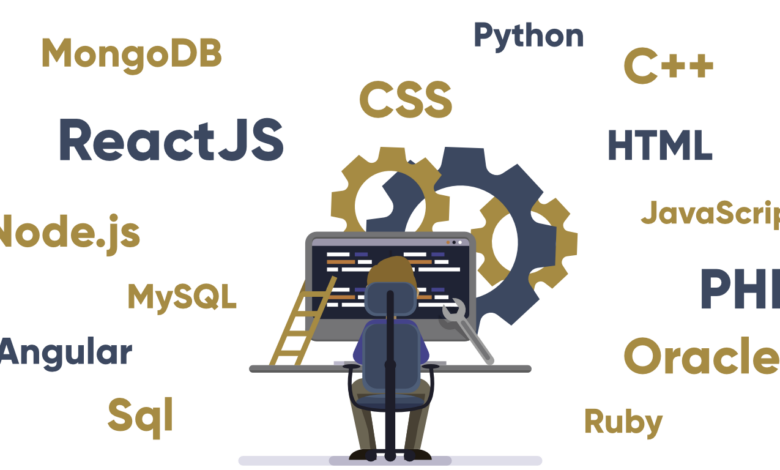What is full stack development? What does a full stack developer do?

The term “full stack development” has become increasingly prevalent in the fast-paced realm of technology, often sparking curiosity and questions about its intricacies. From aspiring programmers to seasoned professionals, the concept of full stack development holds significant relevance in today’s software development landscape. But what exactly does it entail? What skills does a full stack developer have, and what roles do they play in the development process? In this comprehensive guide, we delve into the core essence of full stack development, unraveling its components and shedding light on the multifaceted responsibilities that define the role of a full stack developer. So, let’s embark on a journey to demystify full stack development and explore the diverse skill set and duties that characterize this dynamic field.
The growing prevalence of full stack development has fueled a surge in demand for professionals skilled in this versatile discipline. With the rise of agile methodologies and the need for streamlined development processes, companies seek individuals proficient in front-end and back-end technologies. This convergence simplifies project management and enhances collaboration, driving efficiency and cost-effectiveness. Consequently, more individuals opt for a full stack developer course to capitalize on the expanding job market and acquire a comprehensive skill set that makes them highly adaptable and valuable assets in the competitive tech industry, increasing their employability and career prospects.
What is full stack development?
Full stack development refers to building software applications encompassing front-end and back-end components. A full stack developer is proficient in various frameworks, technologies, and programming languages required to develop the entire application stack, from the user interface to the server-side logic and database management. This holistic approach enables developers to create cohesive, end-to-end solutions, fostering efficient communication between different application layers and ensuring seamless functionality across the entire system.
Importance of full stack development
Full stack development plays a pivotal role in modern software engineering by providing comprehensive expertise across the entire technology stack. Its importance lies in streamlining the development process, fostering collaboration between front-end and back-end teams, and creating cohesive, end-to-end solutions. Full stack developers possess a versatile skill set that enables them to understand and contribute to every aspect of the project, from user interface design to server-side logic and database management. This holistic approach enhances efficiency and agility and enables developers to innovate and adapt to evolving technologies, making full stack development indispensable in today’s competitive digital landscape.
What does a full stack developer do?
Full-stack developers are versatile professionals designing and constructing websites and applications across diverse platforms. Their responsibilities encompass:
- Developing and managing web services and interfaces
- Contributing to both front-end and back-end development processes
- Creating new product features and APIs
- Conducting tests, troubleshooting software, and rectifying bugs
- Collaborating with various departments on projects and sprints
The full-stack development realm constantly evolves with emerging technologies, expanding the possibilities for developers. Keeping updated of the latest trends and techniques is pivotal in this dynamic role. Recent research states that industries with the highest demand for full-stack developers include computer software, information technology, internet services, financial sectors, and higher education.
Full-stack developer skills
Full stack development demands a diverse skill set encompassing both front-end and back-end technologies, along with proficiency in an array of programming languages, frameworks, and tools. Here’s an elaboration on the skills required for full stack development:
Front-End Development
- HTML/CSS: Fundamental for structuring and styling web pages.
- JavaScript (JS): Core language for dynamic interactivity and behavior on web pages.
- Frameworks and Libraries: Familiarity with popular libraries like React, Angular, or Vue.js for building dynamic user interfaces.
- Responsive Design: It is the Ability to create responsive and mobile-friendly layouts using CSS frameworks like Bootstrap or Materialize.
Back-End Development
- Server-Side Languages: Proficiency in languages like JavaScript (Node.js), Python (Django, Flask), Ruby (Ruby on Rails), Java (Spring Boot), or PHP for server-side logic.
- Databases: A professional must be equipped with database management systems like MySQL, PostgreSQL, MongoDB, or SQLite, including database design and querying.
- APIs (Application Programming Interfaces): Ability to develop and consume RESTful or GraphQL APIs for communication between front-end and back-end systems.
- Authentication and Authorization: Understanding of user authentication and authorization mechanisms like JWT (JSON Web Tokens) or OAuth.
Version Control
- Git: Essential for collaborative development, version control, and managing code repositories.
- GitHub or GitLab: Platforms for hosting and managing Git repositories, facilitating collaboration and code review processes.
DevOps
- Deployment: Knowledge of deploying applications to servers or cloud platforms like AWS, Azure, or Google Cloud Platform.
- CI/CD (Continuous Integration/Continuous Deployment): Understanding of automated build, test, and deployment pipelines to streamline development processes.
- Containerization: Familiarity with containerization tools like Docker for packaging applications and Kubernetes for container orchestration.
Soft Skills:
- Problem-Solving: Demonstrating proficiency in analyzing intricate problems and crafting viable solutions.
- Communication: Exhibiting strong interpersonal skills to foster collaboration with team members, grasp project requirements, and articulate technical concepts to non-technical stakeholders effectively.
- Time Management: Efficiently allocating time and prioritizing tasks to adhere to deadlines within the dynamic framework of agile development.
Additional Skills
- Knowledge of Web Servers: Understanding of web server configurations and management (e.g., Apache, Nginx).
- Security Best Practices: Awareness of security vulnerabilities and best practices for securing web applications.
- Testing: Familiarity with testing frameworks like Jest, Mocha, or Selenium for automated testing of both front-end and back-end components.
- UI/UX Design: Basic understanding of user interface and user experience design principles for creating intuitive and user-friendly interfaces.
In essence, full stack developers need to be adaptable, continuously learning, and capable of working across overall software development lifecycle, from conceptualization to deployment and maintenance.
Conclusion
Full stack development encompasses a broad spectrum of skills and responsibilities, bridging the gap between front-end and back-end technologies to create comprehensive software solutions. A full stack developer course equips aspiring professionals with the imperative skills and knowledge to excel in this dynamic field. Right from mastering programming languages and frameworks to understanding deployment strategies and best practices, such courses offers a solid foundation for navigating the complexities of full stack development. By preparing individuals for diverse job roles and empowering them to adapt to evolving technologies, these courses pave the way for a rewarding career in the vibrant world of full stack development.



